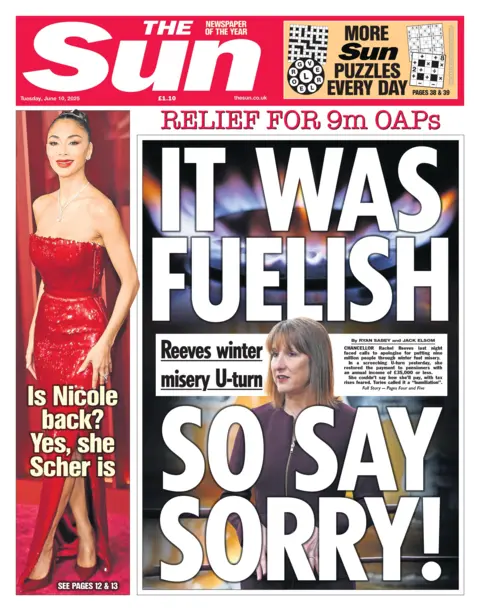The political landscape in the UK has recently been rocked by a significant U-turn from Chancellor Rachel Reeves regarding winter fuel payments. This decision has garnered considerable attention from various media outlets, all framing the event in different lights and highlighting potential implications for the population, especially pensioners.
The Sun, a prominent tabloid, notably described the situation as “fuelish,” focusing on Reeves’s previous stance against winter fuel payments for older citizens. The paper has strongly criticized her original decision to cut these vital payments, arguing that it displayed a lack of foresight and sensitivity towards the elderly. They are calling for an apology, reflecting a widely held sentiment among the public that the U-turn, while promising, should never have been necessary in the first place. Similarly, the Daily Mail echoed this, describing both Reeves and Labour leader Sir Keir Starmer as “deluded,” suggesting that their assertions of having resolved the issues with the economy ring hollow in light of their prior policies.
Meanwhile, the Daily Express has framed the decision as a “victory for pensioners,” celebrating the reinstatement of winter fuel payments, which the Chancellor had originally proposed to scale back. This headline showcases a more uplifting narrative, portraying Reeves’s reversal as a response to public pressure and a triumph for advocates of pensioners’ rights.
The focus on winter fuel payments is not merely a matter of economic reparations; it signifies deeper issues surrounding the government’s fiscal management and the potential repercussions it may have on upcoming budgets. The Guardian has drawn attention to the financial context surrounding this political maneuver, proposing a substantial investment of £14 billion in a new nuclear power plant, Sizewell C, in Suffolk. This initiative, touted as a means to remove the UK from its dependence on fossil fuels, is expected to create about 10,000 jobs and is part of a broader strategy to ensure energy security amidst concerns over rising demand.
The topic of public safety has also surfaced amidst these fiscal discussions. According to The Times, the Chancellor’s refusal to meet Home Secretary Yvette Cooper’s call for extra police funding could have dire consequences, potentially impacting law enforcement’s ability to address crime adequately. This issue of public safety intertwines with the government’s financial decisions, suggesting that budgeting against the backdrop of popular austerity measures is becoming increasingly complex.
The Metro and the Daily Mirror reflected this political saga’s humiliation element, describing the U-turn as “humiliating” for the Chancellor. Both papers underscore the speculation regarding the fallout this could have on tax policies in light of Reeves’s spending decisions. The cost implications of her change of heart are yet to be fully realized, but media commentary suggests a renewed fear of tax increases later in the year.
As the narrative continues to evolve, the dynamics surrounding the proposed budget and energy initiatives seem to indicate a shift in how the public perceives government decision-making. The discourse channels concerns over reliability in fiscal promises and the consequences it could have on social safety nets for vulnerable populations.
Additionally, key articles highlight innovative medical advancements, such as a new NHS treatment using ultrasound to combat hard-to-reach cancers, demonstrating that, while political upheaval persists, scientific progress remains a beacon of hope in the medical field. This treatment has only been available in the U.S. until now, allowing for the potential to save lives without significantly harming surrounding healthy tissue.
In conclusion, the unfolding drama surrounding winter fuel payments and the energy sector’s future signifies more than governmental policy shifts. It reflects a population’s anxiety over economic stability, energy dependency, and efficient management of resources, coupled with a strong desire for accountability from its leaders. The media’s multifaceted portrayal of these issues will undoubtedly shape public opinion as events progress, creating a landscape of ongoing debate as the Chancellor prepares for her next budgetary announcement.



